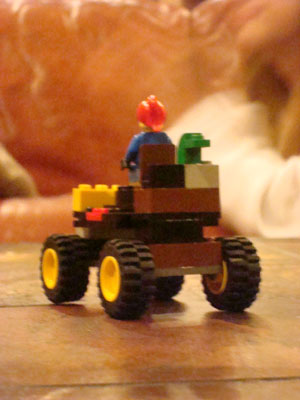All Nonfiction
- Bullying
- Books
- Academic
- Author Interviews
- Celebrity interviews
- College Articles
- College Essays
- Educator of the Year
- Heroes
- Interviews
- Memoir
- Personal Experience
- Sports
- Travel & Culture
All Opinions
- Bullying
- Current Events / Politics
- Discrimination
- Drugs / Alcohol / Smoking
- Entertainment / Celebrities
- Environment
- Love / Relationships
- Movies / Music / TV
- Pop Culture / Trends
- School / College
- Social Issues / Civics
- Spirituality / Religion
- Sports / Hobbies
All Hot Topics
- Bullying
- Community Service
- Environment
- Health
- Letters to the Editor
- Pride & Prejudice
- What Matters
- Back
Summer Guide
- Program Links
- Program Reviews
- Back
College Guide
- College Links
- College Reviews
- College Essays
- College Articles
- Back
Spreading the Joy
Each child has an inner engineer waiting to be nurtured. The FIRST (For Inspiration and Recognition of Science and Technology) robotics programs aim to uncover this talent within every child. They have become a huge part of my life, ever since I joined an FLL team four years ago, as an eighth grader. Through my experience as a participant in FLL, I explored the newest biomedical technology advances and gained a newfound love of not only technology, but also of biomedicine and environmental science. Most importantly, I gained a new confidence in my ability to express ideas and a capacity to learn from others in a team setting, igniting my interest in math and science at school. The enormous impact robotics has had on my life manifested itself into a desire to pass on this experience, and I seized the opportunity to coach a group of young students in a Jr. FLL (First Lego League) team as I moved on to the high school level of competition, FTC (First Tech Challenge), and participates in the FLL program again, but on the other side of the table, as a coach and referee.
There is something special about a child’s imagination. As I have learned over the course of three years as a Jr. FLL and FLL coach, the curiosity and inherent creativity of a young mind is truly unique. The children work together to solve a number of obstacles by programming a robot using Lego brick components, and continuously amaze me with the ideas that they come up with. Every week, I guide them to follow the scientific process and design a project to address a modern problem, using my background knowledge in physics to teach them about concepts such as simple machines and center of mass in relation to the robot’s motion. However, I sometimes, I find that I learn just as much from them as I hope to teach. One striking quality I find in the team that I coach is an eagerness for innovation. The children I work with are willing to take risks and possibly fail in order to try out all of their ideas. Very rarely do they dismiss an idea as “too crazy” to work, and often, it is the silliest or strangest ideas that end up setting the team apart in competition. This year, as a rookie team competing against middle schoolers, the children qualified for the state competition by posting the highest score in the regional qualifier, and I am very proud to have contributed to their success. In turn, I have emulated their open approach to brainstorming with my own high school team, and it has served us well.
As a referee, I have the privilege of meeting hundreds of eager children and their robots, both in informal matches and at official regional and state level competitions. As a regional referee, I help run practice rounds to help students get a feel for what competition day will be like every Monday evening in the fall. Additionally, I take some time to answer questions about robot designs, and I work with the organizers to help new teams become familiar with the program. Being a referee can be challenging. For official competitions, some of my FTC team mates and I wake up early to reach the competition an hour or two before the competitors arrive. Initially, we assemble and inspect the field setups. After the matches begin, I become immersed in a constant scramble to score accurately while resetting the Lego elements on the field, all while staying on an extremely tight schedule! However, I never tire of it. Within each child that I meet, I see the same excitement that propelled me to immerse myself into robotics, and shaped my aspirations for the future. I see the same mixture of anticipation, overshadowed by a contagious enthusiasm to show off a spectacular new mechanism or an impeccable line following program. This is what compels me to wake up early on a Saturday morning and spend hours standing in the midst of a deafening gym for hours.
Inevitably, I walk away from the competition table with an appreciation for the time and effort that is put into every robot, no matter how the scores play out. The newfound confidence and knowledge evident on each of the children’s faces reminds me of how fortunate I am to have parents, teachers, and coaches that have helped me discover my passion for science. Without the guidance of these dedicated individuals, I would not have been able to enter the robotics program by creating an FLL team. Through coaching and refereeing, I hope to play a small part in creating the same wonderful experience of robotics for others that so many have for me.

Similar Articles
JOIN THE DISCUSSION
This article has 0 comments.
